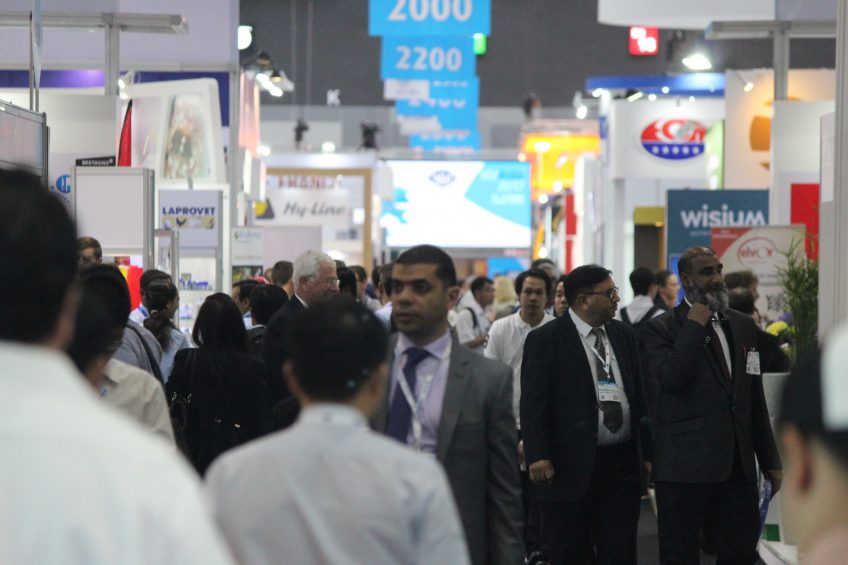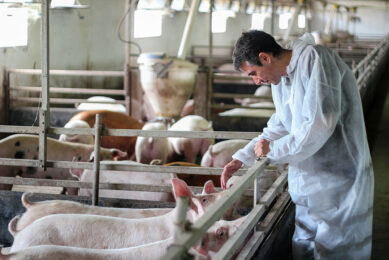Antimicrobial reduction in focus at VIV Asia 2017

Antimicrobial reduction was this year’s theme at VIV Asia 2017, in Bangkok, Thailand. Along with our own event ‘Growth promotion without antimicrobials’ there were other side events dedicated to the topic. Here is a summary.
Ceva Animal Health had a full-day conference on the theme of antibiotic reduction. Its ‘Swine Innovation Summit’ on 14 March, featured six internationally recognised speakers on antibiotic reduction. To name a few, Dr Hetty van Beers, of the Netherlands Veterinary Medicine Authority (SDa), delved deeper into the question of why and how antimicrobials should be used with much care. She also gave examples on why the approach in the Netherlands has been successful.
Giving the meeting a veterinary twist, speakers Dr Nicolas Guerra and Dr Roman Krejci from the animal health company introduced strategies on how vaccination can reduce the reliance on antibiotics. Obviously the company’s extensive vaccine product range can play a role in this, but so do concepts like measuring and treatment traceability. After all, measuring means that improvement is possible. For vaccines, the company’s concepts like ‘Desvac’ with ‘Smartvac’ form a smart way of keeping track of all vaccination applications and provide a connection with the smartphone, Dr Guerra explained. A similar concept is being developed for antimicrobials with injectable treatments, to ensure that their use is deployed as intelligently and effectively as possible. Dr Krejci added that by using vaccines, disease can be prevented, which reduces the need to use antibiotics.
Other speakers included Bill Mayer of Tyson Foods, who shone a light on consumer requirements in the future; Dr Jean-Noël Sialelli of Cooperl explained how antibiotic reduction is achieved in a large French swine integration; and Dr Leo van Leengoed of Utrecht University in the Netherlands spoke of future infection control – to go for adaptation, vaccination or eradication?
Also interesting: Causes, developments and solutions were discussed at Pig Progress’ own event ‘Growth promotion without antimicrobials’
With and without antibiotics
Nutritional health solutions that can work with and without antibiotics – this approach would be a useful option for pig farms struggling to gradually reduce antimicrobials on-farm. This was one of the take-home messages Dr Jason Frank gave, speaking at Diamond V’s seminar ‘Antibiotic use and replacement strategies’.
Dr Jason Frank, the company’s director of non-ruminant research and technical support, discussed the company’s nutritional health products Original XPC and SynGenX, both products are manufactured using proprietary microbial fermentation technology. The company recently started zooming in how these products perform when viewed from a perspective of antimicrobial reduction.
The company shared data demonstrating that both products support proper immune function and beneficial gut microbial populations. Dr Frank presented recent data on e.g. reduced E. coli-related inflammation when applying SynGenX to weaned pigs.
Formulating new piglet diets
Formulating piglet diets under restrictions of antimicrobial usage is in fact still undeveloped territory, but Lars Sangill Andersen of Danish animal nutrition company Hamlet Protein aimed to give some suggestions, at the company’s ‘Feed Your Brain’ seminar at VIV Asia.

He showed the development in Denmark, how antibiotics were gradually banned from being used, ahead of the EU bans. Diet digestibility is the key word in this respect and that needs a closer look to proteins, cereals and fats. With regard to calcium content, he advised not to use limestone, but opt for other sources. In terms of acids in the feed, he suggested a minimum of 0.5% but preferably 1%, with benzoic acid being the most important, then lactic acid and then potentially other acids. He closed off with the recommendation to consider changes made to the diet before using additives.
Why biosecurity matters
Belgian biosecurity company CID Lines invited a prominent, non-commercial speaker to its side symposium at VIV Asia – Prof Jeroen Dewulf from Ghent University, Belgium. The university is a leading institute worldwide in research of antimicrobials and how to reduce them. Well-known for his research on the relationship between biosecurity, management and antimicrobial use, he conveniently summarised a range of trials that have been done at the university in this direction. He made a clear distinction between external and internal biosecurity – or how pathogens may enter a farm, and how can they spread on a farm. Prof Dewulf emphasised that biosecurity should be the basis of any disease programme on a farm. To this end, the university developed BioCheck, an online questionnaire available in various languages, that allows pig and poultry producers to check their biosecurity status.

In addition, Prof Dewulf spoke about the coaching programme that has been set up in Belgium, which is a way of helping producers see where they can improve their health status and thus achieve prudent levels of antibiotic usage. He shared results that this has worked positively for both broiler and pig farms in Belgium.
Join 18,000+ subscribers
Subscribe to our newsletter to stay updated about all the need-to-know content in the pigsector, three times a week. Beheer
Beheer










 WP Admin
WP Admin  Bewerk bericht
Bewerk bericht